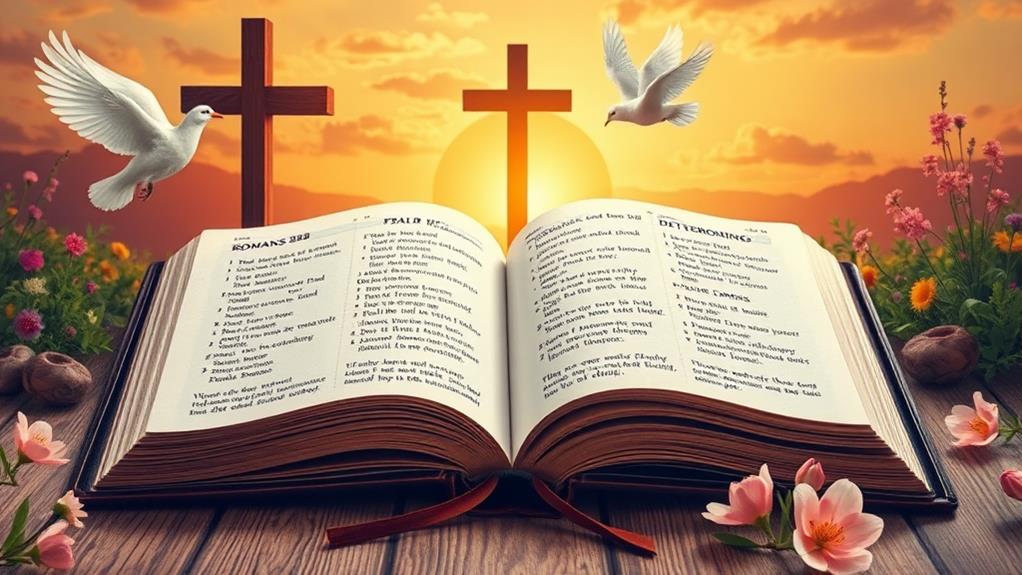The Biblical Meaning of the Number 28: Unveiling Hidden Symbolism
The biblical meaning of the number 28 is woven with profound symbolism, signifying renewal, new beginnings, and divine completion. It is associated with cycles and seasons, as seen in the lunar cycle of approximately 28 days, which mirrors the celestial rhythms and the creation narrative. In Numbers 28, the number is linked to detailed instructions for daily and annual offerings, emphasizing consistent worship and spiritual practices, as well as the sanctity of time and the need for atonement. The number 28 also symbolizes Jesus as the High Priest, highlighting His role in intercession and redemption, and is found in significant events such as Noah's emergence from the ark after 28 days and Jesus's first miracle after 28 years of preparation. This number conveys themes of harmony, balance, and spiritual growth, inviting believers to trust in God's divine order and guidance. Exploring these aspects further reveals the intricate and multifaceted nature of the number 28 in biblical context.
Key Takeaways
- Spiritual Renewal and New Beginnings: The number 28 symbolizes spiritual renewal, new beginnings, and divine completion, as seen in events like Noah's emergence from the ark after 28 days.
- Worship and Devotion: Numbers 28 emphasizes the importance of regular and consistent worship and devotion to God through detailed instructions on daily and annual offerings.
- Divine Order and Cycles: The number 28 is associated with the sanctity of time, honoring specific days and seasons, and reflects divine order and cycles, such as the lunar cycle of approximately 28 days.
- Symbolism of Harmony and Balance: The number 28 embodies duality, harmony, balance, and abundance, representing the importance of unity and harmonious relationships with others and with God.
- Redemptive Significance: The number 28 is linked to Jesus as the Lamb and High Priest, symbolizing the ultimate sacrifice for atonement and ensuring spiritual harmony and divine completeness.
Symbolism of Renewal and New Beginnings

The number 28 holds significant meaning in the context of spiritual renewal and new beginnings. After 28 years of preparation, Jesus initiated his public ministry with his first miracle at the wedding in Cana, marking the beginning of a new era of divine interaction with humanity. This event demonstrated Jesus's divine power and signaled the commencement of a period of spiritual renewal and the fulfillment of God's promises.
The lunar cycle, approximately 28 days, parallels the celestial rhythm of creation, highlighting the natural and divine cycles that guide human existence. This alignment underscores a profound harmony and divine order, encouraging believers to seek balance and renewal in their spiritual journeys.
The number 28 thus serves as a powerful reminder of God's intention for new beginnings and the promise of spiritual rebirth.
Numerological Significance of 28
The numerological significance of the number 28 in the Bible is grounded in the combined meaning of its constituent numbers, 2 and 8. The number 2 typically symbolizes duality, harmony, and balance, while the number 8 is associated with abundance, new beginnings, and spiritual growth. When combined, these numbers enhance each other's meanings, forming a potent symbol of personal transformation and spiritual journey.
In biblical numerology, 28 is considered a number that embodies divine connections and the intricate design of creation. It is the product of 7 (a perfect number) and 4, which underscores its importance in biblical structures and time cycles. For example, the lunar cycle, which approximates 28 days, reflects the celestial rhythms and divine order in the universe.
The number 28 appears in various significant contexts within the Bible. There are 28 writers of the Old Testament, and the phrase "the Lamb," referring to Jesus Christ, occurs 28 times in Scripture. Additionally, the books of Matthew and Acts each contain 28 chapters, emphasizing the themes of completeness and wholeness associated with this number.
This numerological significance conveys a deeper spiritual message, encouraging believers to seek balance and align with divine cycles in their personal transformation and spiritual journey. It invites reflection, introspection, and a profound connection with the divine, highlighting the idea that every phase of life is part of a larger, divinely orchestrated plan. The number 28 also underscores the importance of worship, devotion, and the sanctity of time, as seen in the detailed instructions for daily and annual offerings in Numbers 28.
Biblical Events Associated With 28

The number 28 is intricately linked with several significant biblical events that underscore its theological significance.
In the book of Numbers, chapter 28, detailed instructions are provided for the daily and monthly offerings and sacrifices, emphasizing the importance of consistent worship and the sanctity of time in honoring God. This chapter serves as a reminder of the need for reliance on divine guidance in our lives, paralleling the themes of humility and faith found in names like Logan.
Historically, the number 28 is also associated with pivotal events such as Noah and his family emerging from the ark after 28 days, marking a new beginning for humanity, and Jesus performing his first miracle at the wedding in Cana after 28 years of preparation, signaling the start of his public ministry.
Additionally, the dimensions of the curtains in the tabernacle, as mentioned in Exodus 26:2, involve measurements of 28 cubits, highlighting the precise and divine design of the sacred spaces.
Daily and Monthly Offerings
In the biblical narrative, the chapter of Numbers 28 outlines the ritualistic and sacrificial practices of the Israelites, focusing on daily and monthly offerings. These offerings were essential to the Israelites' worship, reflecting their adherence to God's commands.
The daily burnt offerings, as described in Numbers, involved the sacrifice of two lambs a year old without defect, one in the morning and one in the evening. These offerings, accompanied by grain and drink offerings, symbolized the ongoing nature of God's presence and the people's dependence on Him. This daily ritual was instituted at Mount Sinai and served as a constant reminder of the covenant between God and His people.
Monthly sacrifices also held significant importance. At the beginning of each month, the Israelites were required to present specific offerings, including two young bulls, one ram, and seven male lambs a year old, all without defect. These offerings were accompanied by grain and drink offerings, and included a male goat as a sin offering.
These new moon sacrifices were a public declaration of faith, reinforcing the community's bond with God and with one another. The detailed specifications of these offerings underscore the importance of obedience to God's divine plan and the communal unity achieved through these collective acts of worship.
Significant Historical Events
Associated with the number 28 are several significant events in the biblical narrative, each carrying profound theological and prophetic significance.
One notable event is the emergence of Noah and his family from the ark after the flood, though the Bible specifies 370 days rather than 28 (Genesis 8:14). However, the number 28 is symbolically linked to the lunar cycle, which typically spans 28 days. This connection underscores the idea of times and seasons, emphasizing God's sovereignty over all aspects of life (Ecclesiastes 3:1-8).
In the biblical calendar, the number 28 is also associated with various offerings and sacrifices. Numbers 28 provides detailed instructions regarding the daily and annual offerings to be presented before the Lord, including those for the Sabbath, the monthly New Moon, and the annual festivals such as Passover and the Feast of Tabernacles. These offerings signify the sanctity of time, the need for atonement, and the commitment to obedience, highlighting the importance of regular and consistent worship and devotion to God.
These historical and calendrical connections underscore the symbolic and cultural significance of the number 28 in the biblical narrative, reinforcing themes of renewal, divine guidance, and God's sovereignty over life's cycles and seasons. The recurring theme of 28 in scripture points to notions of completeness, abundance, and divine order, offering a deeper understanding of God's purposes and promises.
The Number 28 in Scripture Count
The number 28 holds significant numerical and theological importance in the Bible, as evidenced by its frequent appearances in various biblical contexts. For instance, the phrase "the Lamb," referring to Jesus Christ, is mentioned 28 times in Scripture, and the word "Hallelujah" also occurs 28 times.
Additionally, the number 28 resonates with the biblical symbolism of stability and order, reflecting the completeness and divine design woven throughout creation.
In terms of biblical structure, the number 28 is associated with the organization of books and chapters; for example, the books of Matthew and Acts each contain 28 chapters in the King James Version, and several chapters across different books have exactly 28 verses.
Additionally, 28 is linked to historical and prophetic significance, such as the 28 writers of the Old Testament and the 28 sons of King Rehoboam, highlighting the number's role in marking important figures and events in biblical history.
Biblical Verses and Books
The number 28 holds significant importance in the biblical narrative, appearing in various counts of verses, chapters, and thematic repetitions that highlight its theological relevance. This number is closely tied to several key aspects of biblical structure and content, revealing deeper meanings and divine messages.
In the Scripture, the number 28 is associated with specific book and chapter counts. For example, the books of Matthew and Acts each contain 28 chapters in the King James Version (KJV). Additionally, certain chapters across various books, such as Matthew 16, Mark 2, and Hebrews 7, each have exactly 28 verses. This arrangement suggests a deliberate design that conveys divine order.
The phrase "the Lamb," referring to Jesus Christ, appears 28 times in Scripture, emphasizing Christ's central role as the redeemer of sins. The word "Hallelujah" also occurs 28 times, reflecting the joy and praise integral to the Christian faith. These repetitions underscore the unity and wholeness symbolized by the number 28, reinforcing its connection to divine messages of salvation and spiritual growth.
These numerical patterns are more than coincidental; they are part of a larger tapestry that reveals the intricate design and harmony within the biblical text. They guide readers towards a deeper understanding of God's plan and purpose.
Historical and Numerical Significance**
The numerical significance of 28 in the biblical narrative is deeply rooted in both historical and theological contexts. This number is associated with themes of renewal, new beginnings, and the fulfillment of God's promises.
In biblical timelines, the number 28 marks significant events. For instance, Noah and his family emerged from the ark after 28 days, signifying a fresh start for humanity (Genesis 8:14). Additionally, Jesus performed his first miracle at the wedding in Cana after 28 years of preparation, initiating his public ministry.
Symbolically, the number 28 is derived from combinations such as 2 and 14, or 4 and 7, each holding distinct meanings. The number 2 represents duality and harmony, while 7 symbolizes perfection and completion. This combination underscores themes of unity, balance, and divine order.
The number 28 also appears in various structural elements of the Bible. There are 28 writers of the Old Testament, and the phrase "the Lamb," referring to Jesus, occurs 28 times in Scripture. Furthermore, the word "Hallelujah" appears 28 times, and the name David is mentioned in 28 books of the Bible.
These occurrences highlight the deliberate and extensive use of the number 28 in the biblical story, reinforcing its role in emphasizing God's plans, renewal, and the intercession of Jesus as the High Priest. For example, the number 28 is linked to Jesus' role as the High Priest who intercedes for us, as seen in verses such as Matthew 27:28 and Ephesians 2:18.
Cycles and Seasons in Biblical Context

In the biblical context, the number 28 is closely associated with the concepts of cycles and seasons, carrying significant spiritual meaning. This connection is evident in the lunar cycle, which approximates 28 days, reflecting the celestial rhythm and the divine blueprint of creation.
The creation narrative in Genesis, where God creates the world in six days and rests on the seventh, sets a precedent for understanding cycles and seasons as part of God's divine order. The number 28 symbolizes renewal, new beginnings, and divine completion.
For example, Noah and his family emerged from the ark after 28 days, marking a fresh start for humanity and symbolizing the completion of a cycle and the beginning of a new era.
The seasonal symbolism associated with the number 28 is further reinforced by biblical cycles of worship and observance. In Ecclesiastes 3:1-8, 28 "times" or seasons are enumerated, highlighting the structured and purposeful nature of time under God's sovereignty. These verses list various seasons for different activities, such as birth, death, planting, and harvesting, emphasizing the intentionality and divine order in the cycles of life.
Additionally, the number 28 is linked to periods of spiritual growth and renewal. It is associated with the fulfillment of God's promises and the beginning of new chapters in life, as seen in the genealogy of Jesus Christ, which spans 28 generations from King David to Jesus.
Unity and Harmony in the Number 28
The concept of unity and harmony is deeply embedded in the biblical significance of the number 28, reflecting themes of cycles and seasons that underscore God's divine order. Composed of the digits 2 and 8, this number carries profound meaning that highlights the importance of spiritual alignment and divine balance.
The number 2 symbolizes duality, partnership, and harmony, emphasizing the need for unity and harmonious relationships both with others and with God. The number 28, as a product of 2 and 14 (or 2 x 7), further reinforces these themes. For instance, the 28 writers of the Old Testament and the 28 occurrences of the phrase "the Lamb" to refer to Jesus Christ illustrate a comprehensive and unified narrative.
In this context, the number 28 represents a deep unity rooted in God's plans and promises. Romans 8:28, for example, indicates that all things work together for good for those who love God, demonstrating a harmonious alignment with God's purpose. This verse underscores the fundamental role of God's divine balance and order in our spiritual well-being and the fulfillment of His promises.
The symbolic connections of the number 28 also highlight Jesus as our High Priest, who intercedes for us and ensures unity between believers and God. Verses such as Ephesians 2:18 and other scriptural references emphasize Jesus' role in facilitating our access to God in one Spirit, thereby maintaining spiritual harmony and unity. This unity is a cornerstone of the biblical message, guiding believers to seek balance and alignment with God's divine order.
Moreover, the number 28 is associated with the lunar cycle, which encompasses approximately 28 days, mirroring the celestial rhythm and divine order established in creation. This connection encourages believers to reflect on the natural and divine cycles guiding their existence and to seek balance within these rhythms.
Significant Texts and Verses

The number 28 holds significant meaning in the Bible, often symbolizing divine completeness, fulfillment, and the implementation of God's perfect plan in the lives of His people.
In the Old Testament, the number 28 is associated with several key themes. For example, in 1 Chronicles 6:15, it is noted that there were 28 leaders from the tribe of Levi who served in the temple, highlighting the connection between the number 28 and themes of service and leadership in God's house.
Additionally, the number 28 is linked to new beginnings and completion. In Genesis 46:26-27, Jacob had 28 direct descendants who moved to Egypt, marking a new beginning for his family. This also reflects the theme of completion, as seen in the Israelites' journey to the Promised Land after 28 years of preparation.
The New Testament also contains notable references to the number 28. The phrase "the Lamb," referring to Jesus Christ, appears 28 times in Scripture, symbolizing redemption and salvation.
Furthermore, Romans 8:28 states, "And we know that in all things God works for the good of those who love him, who have been called according to his purpose," emphasizing the theme of divine order and the assurance that God's plans are for the well-being and prosperity of His people.
These verses and texts provide a rich symbolic interpretation, revealing themes of divine fulfillment, renewal, and the harmony between God's plans and human lives. They invite a deeper reflection on the divine cycles and seasons that govern our existence, underscoring the idea that God is in control and that His plans unfold with perfect timing and order.
Prophetic and Revelatory Significance
The prophetic and revelatory significance of the number 28 in the Bible is deeply intertwined with the concepts of time, seasons, and divine order. This number often symbolizes periods of testing and judgment, while also heralding renewal and the fulfillment of divine promises. In prophetic and revelatory contexts, the number 28 encapsulates the dual nature of human experience with the divine, signaling both trials and triumphs.
The symbolic interpretation of 28 reveals meaningful connections. For example, the lunar cycle, which approximates 28 days, mirrors the celestial rhythm established in the creation narrative, emphasizing a profound harmony and divine order. This connection encourages reflection on the natural and divine cycles that guide human existence, highlighting the importance of aligning with these rhythms for spiritual growth.
In prophetic contexts, the number 28 invites a reflective journey through life's challenges, encouraging the view that these moments are transformative passages leading to spiritual enlightenment. It underscores the idea that trials are essential components of personal and collective growth, each one a stepping stone towards understanding the intricate relationship between the temporal and the eternal.
This perspective offers a profound message of hope and divine guidance, reassuring believers that God's plans are for their well-being and prosperity, even in times of uncertainty. The number 28, therefore, serves as a reminder to trust in God's divine order and guidance, emphasizing themes of completeness and renewal that are central to biblical teachings.
Spiritual Growth and Divine Guidance

In the context of spiritual growth and divine guidance, the number 28 in the Bible carries significant thematic depth, reflecting the intricate and orderly design of God's plan for humanity. This number is associated with completeness, perfection, and the fulfillment of God's promises, highlighting its profound spiritual significance.
The biblical meaning of 28 emphasizes unity and divine order, stressing the harmonious alignment of believers with God's will and purpose. For example, the 28 days of the lunar cycle symbolize the celestial rhythm and divine order of creation, encouraging believers to seek balance and align with natural and divine cycles.
Psalm 28, a heartfelt cry to the Divine for rescue and sustenance, illustrates the power of sincere supplication and unwavering faith, which are essential elements in spiritual growth. Additionally, Romans 8:28 assures believers that God works all things together for the good of those who love Him, according to His purpose, underscoring the importance of trust in God's divine order and guidance.
The number 28 is also linked to Jesus, particularly in the context of His role as the High Priest who intercedes for humanity, providing a clear example of divine intercession and guidance. These themes collectively highlight the role of 28 in guiding believers through their spiritual journeys, ensuring they remain steadfast in their faith and trust in God's providence.
The numerological composition of 28, consisting of the numbers 2 and 8, further reinforces its spiritual significance. The number 2 represents duality, partnership, and harmony, emphasizing the importance of relationships and balance.
Frequently Asked Questions
How Does the Number 28 Relate to the Lunar Cycle in Biblical Context?
In the biblical context, the number 28 relates to lunar symbolism through its association with the complete lunar cycle, comprising four weeks or 28 days, signifying celestial connections and the significance of divine order and renewal in God's creation.
Are There Any Specific Rituals or Practices Associated With the Number 28?
In numerology practices and esoteric traditions, the number 28 is associated with specific rituals and practices, such as the 28-day lunar cycle and the 28-year solar cycle, which are commemorated in Jewish tradition with the recitation of *Birkat Hachama*. This cycle also influences astrological and mystical interpretations, particularly in the Mevlevi sema ritual's 28-beat metric pattern.
Can the Number 28 Be Linked to Any Historical Events Outside Biblical Narratives?
The number 28, often associated with lunar symbolism due to the approximate 28-day lunar cycle, does not have direct links to specific historical events outside biblical narratives. However, its lunar connotations can be interpreted in the context of ancient cultures' astronomical observations and calendrical systems.
How Does the Number 28 Influence Personal Spiritual Growth and Development?
The number 28 is often associated with spiritual transformation and inner enlightenment, signaling a period where one's self-belief, confidence, and positive attitude manifest abundance and new opportunities. It encourages personal integrity, wisdom, and a spiritually-based career or heart-centered service, fostering a path of continuous growth and spiritual evolution.
Are There Any Cultural or Non-Biblical Interpretations of the Number 28?
The number 28 holds significant cultural and non-biblical interpretations, particularly in numerology and astrological influences. In numerology, 28 symbolizes balance, harmony, and duality, often associated with the astrological sign of Virgo, embodying qualities of organization and discipline.
Conclusion
The biblical meaning of the number 28 embodies a rich tapestry of symbolism, highlighting renewal, new beginnings, and divine completion. It is intertwined with cycles and seasons, reflecting God's harmonious design. The numerological significance of 28, derived from the numbers 2 and 8, emphasizes unity, harmony, and balance. Scriptural instances, such as the 28 days after the flood and the 28 years preceding Jesus' public ministry, underscore its importance. This number serves as a reminder of God's promises, spiritual growth, and divine guidance, reinforcing the centrality of worship, atonement, and obedience in the biblical narrative.






